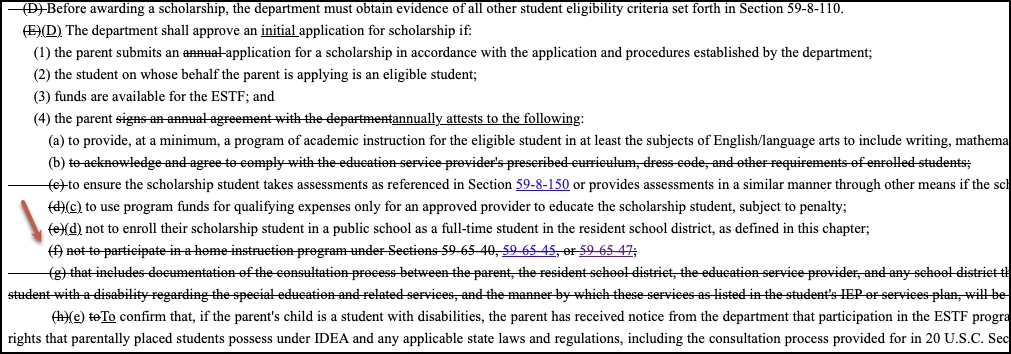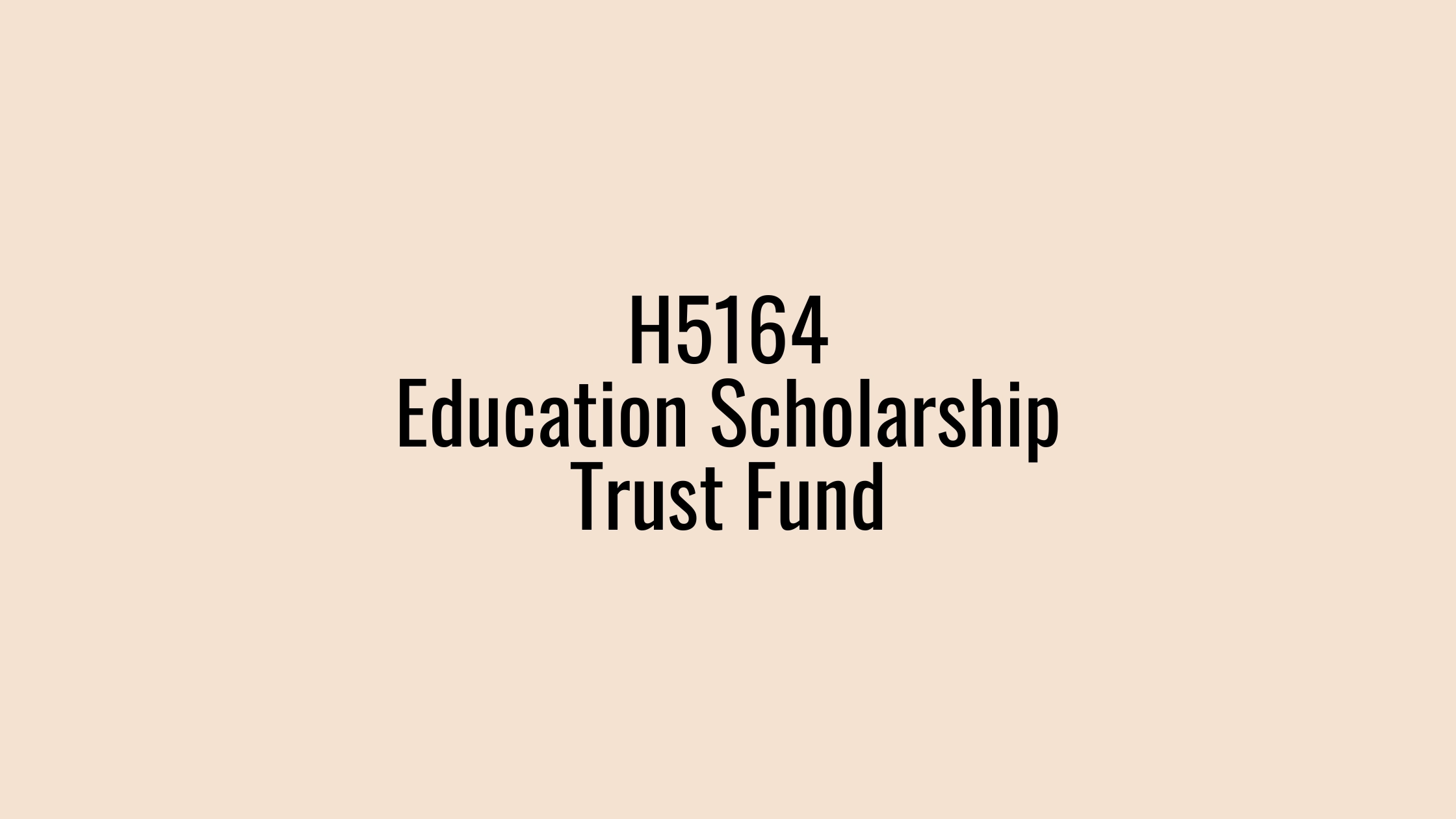H5164: Education Scholarship Trust Fund
Hold onto your hats, folks, because the educational landscape is about to get a whole lot more controversial. The Education Scholarship Trust Fund (ESTF) PART 2 is now extending its reach to include homeschoolers and ALOT MORE. (Yikes!)
Yes, you read that right: HOMESCHOOLERS.
Please note: The strikethrough text regarding homeschooling laws suggests that the bill is proposing to make homeschoolers eligible for the scholarship program. It removes the previous restriction that excluded them.

READ IT H5164
At first glance, this might seem like a win for the homeschooling community. Finally, some recognition and financial support from the government, right? Wrong. This move is akin to inviting a Trojan horse into the sacred grounds of educational freedom, especially for those operating under the less conventional umbrella of Option 3 in South Carolina's homeschool laws.
South Carolina lays out three distinct paths for homeschooling, each with its own set of guidelines and legal frameworks. Whether you're navigating the waters via your local school district, SCAIHS, or an independent Homeschool Association, the introduction of H5164 under the ESTF spells trouble. Why, you ask? Because this bill will very well be the beginning of the end for homeschooling as we know it.
Let's break it down, shall we?
Firstly, accepting government funds is akin to selling your soul, metaphorically speaking. The ESTF, funded by the government, comes with strings attached – conditions and criteria that will restrict how and what you teach. While the TRUTH is in the details, namely sections 9 (C) and 2 (4) of H5164, the long and short of it is this: the government gets a say in your homeschooling. And, as history has shown, what the government funds, it tends to control.
Secondly, there's the issue of dependency. Once you start relying on government funds to educate your kids, it's a slippery slope. Before you know it, you're trapped in a cycle of needing more funds, which, in turn, gives the government more leverage over your educational choices. Not to mention, the influx of government money WILL drive up the cost of homeschooling materials and classes.
Thirdly, let's talk about legal plunder. Yes, you heard that right. This term, coined by Frédéric Bastiat, perfectly encapsulates what's happening here. The government is redistributing wealth, taking from some to give to others under the guise of education funding. But here's the kicker: even those who opt out of the ESTF will still be footing the bill through their taxes. It's a lose-lose situation.
BTW: There is no fiscal impact statement for H5164, so how much is this going to cost the taxpayers of South Carolina?
And lastly, let's not delude ourselves into thinking that taking money from a flawed system will somehow fix it. If anything, it'll only serve to entangle homeschoolers in the very bureaucracy and red tape they sought to avoid.
LEGISLATIVE ACTION:
Bill H5164 is scheduled for discussion during the House K-12 Subcommittee Tuesday, March 5, 2024 and Full committee meeting on Wednesday, March 6, 2024, approximately one hour following the adjournment of the House.
PAUSE: The General Assembly is pushing this bill with unusual speed, shown by TWO committee meetings scheduled on the same day. Plus, the ink's barely dry on the law from June 10, 2023, and they're already fixing it. This haste often lays the groundwork for more problematic laws down the line.
To our homeschooling community, we respectfully encourage you to consider the implications of this bill. It proposes to include homeschoolers as eligible recipients of funds from the Education Scholarship Trust Fund (ESTF), a move that, while seemingly beneficial, could have far-reaching consequences for homeschooling freedoms.
We understand that educating your children at home comes with financial challenges. However, accepting government assistance often comes with conditions that could limit your educational autonomy. It's crucial to ask ourselves if the potential benefits outweigh the risks to our independence in deciding how to educate our children.

Moreover, opting not to apply for these funds does not necessarily safeguard our homeschooling freedoms. Should a significant number of homeschoolers start to rely on this financial support, it WILL lead to increased demands for funding and accompanying regulations, potentially reducing our educational freedom.
As this bill moves forward, we urge you to voice your concerns to the committee members. Advocate for the exclusion of homeschoolers from this bill to preserve the essence of educational choice and autonomy that homeschooling offers. Remember, the decision to apply for government funds is personal, but the collective impact could shape the future of homeschooling freedom.
Update 3/9/24
Rep Cromer introduced an amendment (it passed) to exempt homeschoolers from the following:
Curriculum and Attendance Requirements: The curricula and attendance requirements do not apply to home instruction programs under Sections 59-65-45 or 59-65-47.
Education Service Provider Reporting Requirements: An education service must certify to the department that it continues to meet all program requirements. An education service provider required to administer academic testing must provide the department with test score data from the previous school year. If individual student test score data are not submitted, the department will remove the education service provider from the program.
Amendment: The reporting requirements do not apply to home instruction programs under Sections 59-65-45 or 59-65-47.
Section Amendment Section 59-8-150 (Requirements for education service providers, department, and Education Oversight Committee): An additional section to be added states that of the South Carolina Code, (K) This section does not apply to home instruction programs under Sections 59-65-45 or 59-65-47.
It is important to note the following: This bill is headed to the House Floor, where the House will amend it further, including the high probability of striking and deleting the amendment adopted in full committee. This consideration is crucial because the introduction of numerous amendments outside public scrutiny will most likely further compromise this bill.
Another critical fact to consider regarding whether this amendment will remain pertains to the requirement for accountability attached to public funding; it’s unlikely the amendment regarding homeschoolers will persist. When the bill reaches the legislative floor, it’s probable that it will be deleted.
So, what does this mean for homeschoolers?
It is imperative that you examine the bill independently. Despite its complexity and potential for confusion, including homeschoolers poses a risk to the autonomy of real homeschool education—parent-led and parent-funded.
Do not let the bill's intricacies prevent you from consulting your representative for clarifications.
Consider how the bill aligns with existing laws, potential contradictions, and unforeseen consequences.
The quick emergence of this bill illustrates that increased regulation for homeschoolers is a real possibility.
We believe the best protection of homeschooling freedom is to completely exclude homeschoolers from eligibility for the Education Savings Trust Fund (ESTF). Adding another layer of regulation threatens the true principles of homeschooling.
Your support in this matter is highly appreciated.

Subscribe to ConservaTruth's Email Newsletter for curated insights on South Carolina's legislative activities and conservative viewpoints, delivered straight to your inbox! With vetted and easy-to-understand information, our newsletter empowers you to become an informed and engaged citizen, actively participating in safeguarding our cherished Constitutional values. Don’t miss out on crucial updates—join our community of informed conservatives today!





Comments